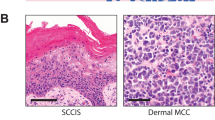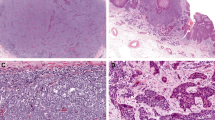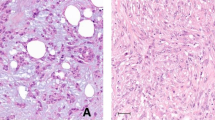Abstract
The p73 gene has been mapped to 1p36.33, a region which is frequently deleted in a wide variety of neoplasms including tumours of neuroectodermal origin. The p73 protein shows structural and functional homology to p53. For these reasons, p73 was considered as a positional and functional candidate tumour suppressor gene. Thus far, mutation analysis has provided no evidence for involvement of p73 in oligodendrogliomas, lung carcinoma, oesophageal carcinoma, prostatic carcinoma and hepatocellular carcinoma. In neuroblastoma, two mutations have been observed in a series of 140 tumours. In view of the occurrence of 1p deletions in Merkel cell carcinoma (MCC) and the location of p73 we decided to search for mutations in the p73 gene in five MCC cell lines and ten MCC tumours to test potential tumour suppressor function for this gene in MCC. In view of the possible complementary functions of p73 and TP53 we also examined the status of the TP53 gene. Sequence analysis of the entire coding region of the p73 gene revealed previously reported polymorphisms in four MCCs. In one MCC tumour, a mis-sense mutation located in the NH2-terminal transactivation region of the p73 gene was found. These results show that p73, analogous to neuroblastoma, is infrequently mutated in MCC. This is also the first report in which the role of TP53 in MCC has been investigated by sequencing the entire coding region of TP53. TP53 mis-sense mutations and one non-sense mutation were detected in three of 15 examined MCCs, suggesting that TP53 mutations may play a role in the pathogenesis or progression of a subset of MCCs. Moreover, typical UVB induced C to T mutations were found in one MCC cell line thus providing further evidence for sun-exposure in the aetiology of this rare skin cancer. © 2000 Cancer Research Campaign
Similar content being viewed by others
Article PDF
Change history
16 November 2011
This paper was modified 12 months after initial publication to switch to Creative Commons licence terms, as noted at publication
References
Brash DE, Rudolph JA, Simon JA, Lin A, McKenna GJ, Baden HP, Halperin AJ and Ponten J (1991) A role for sunlight in skin cancer: UV-induced p53 mutations in squamous cell carcinoma. Proc Natl Acad Sci USA 88: 10124–10128
Cho Y, Gorina S, Jeffrey PD and Pavletich NP (1994) Crystal structure of a p53 tumour suppressor–DNA complex: understanding tumorigenic mutations. Science 265: 346–355
Ichimiya S, Nimura Y, Kageyama H, Takeda N, Sunahara M, Shishikura T, Nakamura Y, Sakiyama S, Seki N, Ohira M, Kaneko Y, McKeon F, Caput D and Nakagawara A (1999) p73 at chromosome 1p36 is lost in advanced stage neuroblastoma but its mutation is infrequent. Oncogene 18: 1061–1066
Jost CA, Marin MC and Kaelin WG Jr (1997) p73 is a human p53-related protein that can induce apoptosis. Nature 389: 191–194
Kaghad M, Bonnet H, Yang A, Creancier L, Biscan JC, Valent A, Minty A, Chalon P, Lelias JM, Dumont X, Ferrara P, McKeon F and Caput D (1997) Monoallelically expressed gene related to p53 at 1p36, a region frequently deleted in neuroblastoma and other human cancers. Cell 90: 809–819
Kovalev S, Marchenko N, Swendeman S, LaQuaglia M and Moll UM (1998) Expression level, allelic origin, and mutation analysis of the p73 gene in neuroblastoma tumours and cell lines. Cell Growth Diff 9: 897–903
Mai M, Huang H, Reed C, Qian C, Smith JS, Alderete B, Jenkins R, Smith DI and Liu W (1998 a) Genomic organization and mutation analysis of p73 in oligodendrogliomas with chromosome 1 p-arm deletions. Genomics 51: 359–363
Mai M, Yokomizo A, Qian C, Yang P, Tindall DJ, Smith DI and Liu W (1998 b) Activation of p73 silent allele in lung cancer. Cancer Res 58: 2347–2349
Mihara M, Nimura Y, Ichimiya S, Sakiyama S, Kajikawa S, Adachi W, Amano J and Nakagawara A (1999) Absence of mutation of the p73 gene localized at chromosome 1p36.3 in hepatocellular carcinoma. Br J Cancer 79: 164–167
Mitelman F, Johansson B and Mertens F (1998). Catalog of Chromosome Aberrations in Cancer ’98, Wiley-Liss: New York
Nimura Y, Mihara M, Ichimiya S, Sakiyama S, Seki N, Ohira M, Nomura N, Fujimori M, Adachi W, Amano J, He M, Ping YM and Nakagawara A (1998) p73, a gene related to p53, is not mutated in esophageal carcinomas. Int J Cancer 78: 437–440
Nomoto S, Haruki N, Kondo M, Konishi H, Takahashi T, Takahashi T and Takahashi T (1998) Search for mutations and examination of allelic expression imbalance of the p73 gene at 1p36.33 in human lung cancers. Cancer Res 58: 1380–1383
Ratner D, Nelson BR, Brown MD and Johnson TM (1993) Merkel cell carcinoma. J Am Acad Dermatol 29: 143–156
Schmid M, Janßen K, Dockhorn-Dworniczak B, Metze D, Zelger BW, Luger TA and Schmid KW (1997) p53 abnormalities are rare events in neuroendocrine (Merkel cell) carcinoma of the skin. An immunohistochemical and SSCP analysis. Virchows Arch 430: 233–237
Schwab M, Praml C and Amler LC (1996) Genomic instability in 1p and human malignancies. Genes Chromosomes Cancer 16: 211–229
Sunahara M, Ichimiya S, Nimura Y, Takada N, Sakiyama S, Sato Y, Todo S, Adachi W, Amano J and Nakagawara A (1998) Mutational analysis of the p73 gene localized at chromosome 1p36.3 in colorectal carcinomas. Int J Oncol 13: 319–323
Takada N, Ozaki T, Ichimiya S, Todo S and Nakagawara A (1999) Identification of a transactivation activity in the COOH-terminal region of p73 which is impaired in the naturally occurring mutants found in human neuroblastomas. Cancer Res 59: 2810–2814
Takahashi H, Ichimiya S, Nimura Y, Watanabe M, Furusato M, Wakui S, Yatani R, Aizawa S and Nakagawara A (1998) Mutation, allelotyping, and transcription analyses of the p73 gene in prostatic carcinoma. Cancer Res 58: 2076–2077
Van Gele M, Van Roy N, Ronan SG, Messiaen L, Vandesompele J, Geerts ML, Naeyaert JM, Blennow E, Bar-Am I, Das Gupta TK, van der Drift P, Versteeg R, Leonard JH and Speleman F (1998) Molecular analysis of 1p36 breakpoints in two Merkel cell carcinomas. Genes Chromosomes Cancer 23: 67–71
Van Roy N, Laureys G, Cheng NC, Willem P, Opdenakker G, Versteeg R and Speleman F (1994) 1;17 translocations and other chromosome 17 rearrangements in human primary neuroblastoma tumours and cell lines. Genes Chromosomes Cancer 10: 103–114
Author information
Authors and Affiliations
Rights and permissions
From twelve months after its original publication, this work is licensed under the Creative Commons Attribution-NonCommercial-Share Alike 3.0 Unported License. To view a copy of this license, visit http://creativecommons.org/licenses/by-nc-sa/3.0/
About this article
Cite this article
Gele, M., Kaghad, M., Leonard, J. et al. Mutation analysis of P73 and TP53 in Merkel cell carcinoma. Br J Cancer 82, 823–826 (2000). https://doi.org/10.1054/bjoc.1999.1006
Received:
Revised:
Accepted:
Published:
Issue date:
DOI: https://doi.org/10.1054/bjoc.1999.1006
Keywords
This article is cited by
-
Merkel cell carcinoma: Epidemiology, pathogenesis, diagnosis and therapy
Reviews in Endocrine and Metabolic Disorders (2017)
-
Cutaneous squamous and neuroendocrine carcinoma: genetically and immunohistochemically different from Merkel cell carcinoma
Modern Pathology (2015)
-
Merkel-Zell-Karzinom
Der Pathologe (2014)
-
Mechanisms of p53 Restriction in Merkel Cell Carcinoma Cells Are Independent of the Merkel Cell Polyoma Virus T Antigens
Journal of Investigative Dermatology (2013)
-
Merkel cell carcinoma: What do we know about it and what should we do?
Clinical and Translational Oncology (2012)



